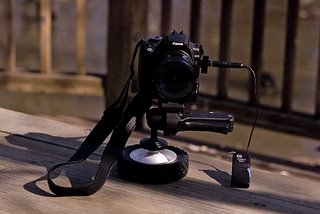Working on a media project on bird flu in our local waterfoul public feeding areas gave my remote Xt a work out. Here is the set up that I talked about in a previous post.

As you can see, I hooked my ball head (Bogen grip tripod head) to a small wheel. For larger lenses, I may look at a larger wheel for more stability, but with the 17-40 and the Xt, it works pretty well.

Bird Flu
In 1918, 87 years ago, 72 people died in Brevig Mission after a pandemic caused by bird flu occurred. In fact, tens of millions of people died from this version of the avian flu. This is something that we all do not want to see happen again. While scientists are studying the current H5N1 strain to figure out a way to contain it, a little common sense and taking precautions can go a long way in protecting yourself if you come in contact with wild birds.
As a photographer in Eagle River, I thoroughly enjoy visiting our local water fowl viewing location, the duck pond at the Duck Pond Car Wash. There are many different species that make up the year round residents of the duck pond. Dozens and dozens of male and female mallards, domesticated ducks, geese of many flavors, peacocks, various chickens and their furry friends, those long eared bunnies. These by themselves seem harmless, with the exception of the geese who find it fun to try to bite your fingers as you feed them. The ability to get so close to these animals even as domesticated as they are, is great for photography. And this is part of the draw of any duck pond. But this can also be a drawback for health and safety. Even with a daily cleaning or the visitors area, birds are not clean animals. They stand on the railings, picnic table, and boardwalks, and unlike humans, when they feel the need to go, they go. Then, as spring rolls in, these friendly, fun critters are joined by temporary guests, which include Canadian Geese and hundreds of Seagulls, including my favorite, the Bonaparte Gull. This infusion of truly wild animals and domesticated animals can cause a major problem if even one of the new residents is carrying the dreaded bird flu.
The H5N1 Bird Flu, which is mainly found in Asia, greatly in regions of China, is becoming widespread with cases reported as far away as Nigeria and Scotland. It is only a matter of time before this virus makes its way to the United States. Experts predict that the far west coast of Alaska, around the city of Nome and villages like Brevig Mission will see the first signs of the flu. Thinking of how far the Canadian Geese fly on their seasonal migration, it is only a matter of time before it makes its way through the state and into our back yards and to the duck pond. In Asia, the unfortunate answer to the bird flu is to kill all the birds in areas where the flu is found. Domestic, farm, wild. Anything that might continue the disease is destroyed. Eradication is currently the only answer until scientists come up with a cure. Not all birds are carrying the bird flu, but there is no telling what any of these birds may be carrying.
I do not want to tell anyone to stay away from their local duck pond in fear of getting sick, but you can take precautions to make sure you and your loved ones stay safe. Using a little common sense can go a long way in protecting you and your loved ones. If you are taking a lunch to the pond, take a table cloth with you and have pleanty of wet naps with you. The birds have the run of the place and while the picnic tables are kept pretty clean, you never know when any one of the birds may have decided it was a great place to use as a out house. Have a small bottle of hand sanitizer with you and clean your hands after you feed the animals. Keep the urge to pet the “tame” water foul in check. I have seen many times a young child excited about touching the pretty feathers on the birds and then sit down for their happy meal. Not only is this a good idea to prevent the possibility of picking up something that you may not want, but I have found out the hard way, these birds bite.
Flu or no flu, just keeping yourself clean is always a good idea after coming in contact with outdoor animals. Also, if you have any suspicions that a bird is infected with the bird flu or some other disease, contact your local authorities as soon as possible.
 As you can see, I hooked my ball head (Bogen grip tripod head) to a small wheel. For larger lenses, I may look at a larger wheel for more stability, but with the 17-40 and the Xt, it works pretty well.
As you can see, I hooked my ball head (Bogen grip tripod head) to a small wheel. For larger lenses, I may look at a larger wheel for more stability, but with the 17-40 and the Xt, it works pretty well.

No comments:
Post a Comment